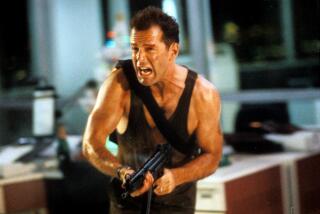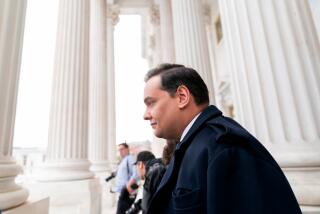A Modern Legend Who Filled a National Void
- Share via
John Wayne avoided serving in the armed forces during World War II. Yet Gen. Douglas MacArthur viewed Wayne as the model of an American soldier. The Veterans of Foreign Wars honored him with a gold medal, and a generation of baby boomers marched off to war inspired by images of his on-screen heroics.
Though he never held public office, Wayne’s impact on national politics looms larger than that of most professional politicians.
Both supporters and critics of American foreign policy during the 1960s and ‘70s said it was burdened with a “John Wayne syndrome.” After Wayne died in 1979, Congress struck a gold medal in his honor.
During his Hollywood heyday, Wayne maintained his position as one of the top 10 box office draws for a quarter of a century. And in 1995--nearly two decades after he was buried in Newport Beach--a poll ranked the Duke as America’s favorite movie star.
None of which surprises Pulitzer Prize-winner Garry Wills, whose new book examines this enduring American icon.
“John Wayne embodies our deepest myth, the myth of the frontier,” Wills said in an interview. “The frontier is the defining American legend--there is no more powerful one--and he’s the best modern exponent of it.”
As Wills writes in “John Wayne’s America: The Politics of Celebrity” (Simon and Schuster, 1997): “Wayne’s innate qualities are not enough to explain so large a social” impact. “He had to fill some need in his audience. . . . When he was called the American, it was a statement of what his fans wanted America to be. . . . He stood for an America people felt was disappearing or had disappeared, for a time ‘when men were men.’ ”
In his book, Wills focuses on the films that created this enduring “mythical figure” whose posthumous honors include “a colossal striding statue at the airport named for him in Orange County.”
Wills, an adjunct professor of history at Northwestern University in Evanston, Ill., is the author of 19 other books, including “Reagan’s America,” “Nixon Agonistes” and “Lincoln at Gettysburg” for which he received the 1992 Pulitzer Prize.
So why a book on Wayne?
“I’d written about Nixon and Reagan, and editors always want you to repeat yourself,” Wills said by phone before leaving Evanston on a cross-country book tour.
“I was asked to write about Carter, Ford and Bush, and none of them seemed to me to have the mythic quality that Nixon and Reagan did. These [two] people summarized a lot of aspirations and became a symbolic figure to their followers, and none of the [other] practicing politicians had that kind of stature.”
But here, Wills said, was John Wayne--a man that even Nixon and Reagan cited when they wanted to explain their values to the American people.
“Nixon said [to] go see [Wayne’s western movie] ‘Chisum’ to understand law and order in American life, so obviously he had a political role to play in people’s imaginations,” Wills said. “That made him closer in my mind to Reagan and Nixon than to whatever Carter, Ford and Bush could ever be.”
Reviews for “John Wayne’s America” have been mixed. Like Wayne himself, Wills’ book is one you either love or you don’t.
Publishers Weekly called “John Wayne’s America” a “stunning book” and “essential reading for anyone interested in Wayne and popular culture.” Kirkus Reviews labeled it “a major achievement in cultural criticism that will not be easily surpassed.”
The New York Times saw it differently:
“Although Mr. Wills brings his usual acumen and fluency to this discussion, the long-winded volume he has produced is really little more than a modest essay, padded out to book length with biographical asides, tired analyses of Wayne’s movies and detailed assessments of his work with the directors John Ford and Howard Hawks.”
Agreed a reviewer for the Los Angeles Times: “Certainly there is something slapdash about this book--as if the author himself were a bit puzzled by the audacity of the project. Were it a movie, you might say that its director was undecided on his focus.”
In writing about Wayne, Wills said, “I don’t really come at it as a biography, and I leave out a lot about his private life. It’s the Wayne who is fashioned by the movies who has had this impact on people. He is more the product of movies and movies alone than any other [Hollywood] figure I can think of.”
*
Americans, Wills said, need mythic characters like Wayne.
“I don’t know any society that doesn’t,” he said. “They all have these national hero figures--whether the French with Joan of Arc or the Spanish with El Cid or the British with King Arthur. We all have these mythic figures, and in America they mostly have been connected with the frontier--from fictional Natty Bumppo [the central figure in James Fenimore Cooper’s ‘The Leatherstocking Tales’] to real-life Kit Carson, Davy Crockett and William Cody. . . .
“Wayne is in that line of succession, and he is the 20th century’s most powerful representative of it.”
More to Read
Sign up for our Book Club newsletter
Get the latest news, events and more from the Los Angeles Times Book Club, and help us get L.A. reading and talking.
You may occasionally receive promotional content from the Los Angeles Times.







